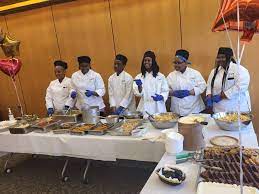The Art of Culinary Excellence: Culinary Arts Training Programs
Embark on a journey to master the art of culinary excellence through specialized culinary arts training programs. These programs offer aspiring chefs the opportunity to develop their skills, knowledge, and creativity in the world of gastronomy.
At the core of a culinary arts training program is a comprehensive curriculum that covers a wide range of topics essential for success in the culinary industry. Students learn fundamental cooking techniques, food safety and sanitation practices, menu planning, nutrition, kitchen management, and more.
Hands-on training is a key component of these programs, allowing students to practice their skills in a real kitchen environment. Under the guidance of experienced chefs and instructors, students hone their cooking techniques and learn to work efficiently in a fast-paced culinary setting.
Furthermore, culinary arts training programs often include opportunities for externships or internships at renowned restaurants, hotels, or catering companies. These practical experiences provide students with valuable industry exposure and networking opportunities that can help jumpstart their culinary careers.
Upon completion of a culinary arts training program, graduates are equipped with the necessary skills and knowledge to pursue various career paths in the culinary world. Whether aspiring to become a chef de cuisine at a fine dining restaurant, open their own catering business, or work in food media or hospitality management, the possibilities are endless.
For individuals passionate about food and eager to turn their culinary dreams into reality, enrolling in a culinary arts training program is the perfect first step towards achieving their goals. With dedication, hard work, and creativity, aspiring chefs can unlock their full potential and make a mark in the vibrant world of gastronomy.
Essential Guide to Culinary Arts Training Programs: Understanding the Basics, Entry Requirements, Duration, Curriculum, and Hands-On Opportunities
- What is a culinary arts training program?
- What are the entry requirements for a culinary arts training program?
- How long does a typical culinary arts training program last?
- What topics are covered in a culinary arts training program curriculum?
- Are there opportunities for hands-on experience or internships during a culinary arts training program?
What is a culinary arts training program?
A culinary arts training program is a specialized educational course designed to equip individuals with the essential skills and knowledge needed to excel in the culinary industry. These programs offer comprehensive instruction in cooking techniques, food safety practices, menu planning, kitchen management, and more. Through a combination of hands-on training and classroom learning, students develop their culinary skills and gain practical experience in a professional kitchen setting. Culinary arts training programs provide aspiring chefs with the foundation they need to pursue rewarding careers in various sectors of the culinary world, from fine dining restaurants to catering businesses and beyond.
What are the entry requirements for a culinary arts training program?
To enroll in a culinary arts training program, aspiring students typically need to meet certain entry requirements. While specific criteria may vary depending on the institution, common prerequisites often include a high school diploma or equivalent, a passion for cooking and the culinary arts, and a willingness to learn and work in a fast-paced kitchen environment. Some programs may also require applicants to submit letters of recommendation, a personal statement outlining their interest in culinary arts, and/or undergo an interview process to assess their motivation and commitment to pursuing a career in the culinary industry. Additionally, previous experience in the food service industry or completion of related coursework can be beneficial but is not always mandatory for admission.
How long does a typical culinary arts training program last?
A typical culinary arts training program typically lasts anywhere from six months to two years, depending on the level of depth and specialization desired by the student. Certificate programs can be completed in as little as six months and provide a solid foundation in culinary skills. Associate degree programs usually take around two years to complete and offer a more comprehensive education that includes additional coursework in areas such as kitchen management, nutrition, and menu planning. Ultimately, the duration of the program varies based on the student’s goals and the intensity of the curriculum they choose to pursue.
What topics are covered in a culinary arts training program curriculum?
A culinary arts training program curriculum typically covers a wide range of essential topics to provide students with a comprehensive understanding of the culinary industry. Students can expect to delve into fundamental cooking techniques, food preparation and presentation skills, kitchen safety and sanitation practices, menu planning and development, nutrition principles, culinary terminology, kitchen management, and the art of flavor pairing. Additionally, students may explore specialized topics such as baking and pastry arts, international cuisine, wine and beverage studies, and sustainable cooking practices. This diverse curriculum ensures that aspiring chefs are well-rounded in their culinary knowledge and skills as they prepare for a successful career in the dynamic world of gastronomy.
Are there opportunities for hands-on experience or internships during a culinary arts training program?
Yes, culinary arts training programs often provide opportunities for hands-on experience or internships as part of the curriculum. These practical components are essential for students to apply their classroom knowledge in real-world culinary settings. Through hands-on experience in professional kitchens, students can develop their cooking skills, gain valuable industry exposure, and build relationships with experienced chefs. Internships at renowned restaurants, hotels, or catering companies allow students to immerse themselves in the fast-paced environment of the culinary industry and acquire firsthand knowledge of kitchen operations. These opportunities not only enhance students’ learning but also prepare them for successful careers in the dynamic world of gastronomy.

